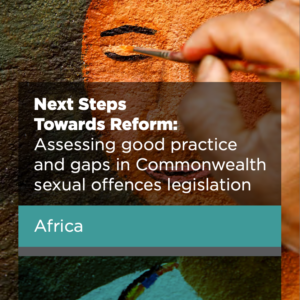Sexual assault crimes are gender-neutral. Definitions of sexual assault offences must not exclude any potential victim/survivor or perpetrator, regardless of sex, gender, sexual orientation, gender identity, age, disability status, marital status or any other status. All victim/survivors should have equal protection of the law.
In some Commonwealth countries penetrative sexual offences, such as rape and child rape, are conceived in law (and in common understanding) as a crime that can only be committed by a male against a female. Accordingly, in many countries rape is limited to sexual intercourse and the penetration of a vagina by a penis. Excluding the rape of males is discriminatory and not good practice. Some countries that maintain ‘buggery’ and ‘sodomy’ laws may criminalise non- consensual anal sex under such provisions. However, good practice requires the repeal of these crimes and for anal ‘rape’ to be included in the general sexual assault provisions, for example as ‘rape’ and ‘sexual assault’, and in child sexual offences. All of these crimes should be gender-neutral.
Meeting this good practice indicator does not preclude including additional specific offences of violence against women and girls, for example in acknowledgement that they are overwhelmingly the target of many forms of violence, including sexual assault and domestic violence. This is an approach a small number of countries have taken.



